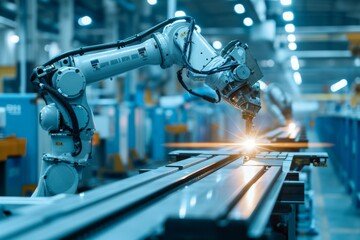The integration of advanced robotics, including collaborative robots and autonomous mobile robots, alongside AI, is setting the stage for the next generation of industrial manufacturing, where AI powered machinery will play a significant role in creating a more flexible, efficient, and human-centered automation landscape.
Autonomous off-highway vehicles equipped with AI systems can analyze vast amounts of data in real-time, enabling them to make decisions with unprecedented precision. For instance, in agriculture, AI-powered tractors can optimize planting, watering, and harvesting processes. By employing sensors and computer vision, these machines can assess soil conditions, monitor crop health, and even identify weeds or pests. This level of precision reduces waste, conserves resources, and maximizes yield, ultimately leading to more sustainable farming practices.
In the mining industry, autonomous vehicles navigate complex terrains, performing tasks like drilling, hauling, and site surveying. AI algorithms allow these machines to analyze geological data, predict equipment failures, and adjust operational parameters on the fly, thereby enhancing productivity and reducing downtime. The result is a safer work environment, as these machines can operate in hazardous conditions without putting human lives at risk.
Safety is a critical concern in off-highway operations, where the environment can be unpredictable and dangerous. AI enhances safety by enabling machines to perceive their surroundings and react to potential hazards. Using advanced sensors and cameras, autonomous machinery can detect obstacles, other vehicles, or personnel in real-time. AI-driven systems can also implement predictive maintenance, identifying issues before they lead to equipment failures or accidents. This proactive approach minimizes risks and ensures a safer operational environment.
The shift towards AI in off-highway machinery is also fostering greater environmental responsibility. Autonomous machines can operate more efficiently, using less fuel and generating fewer emissions. In agriculture, AI can promote sustainable practices by optimizing resource use, such as water and fertilizers, reducing runoff and conserving ecosystems. In mining, autonomous trucks can be programmed to follow the most efficient routes, minimizing the environmental footprint of extraction activities.
In conclusion, the use of AI in autonomous off-highway machinery represents a significant leap forward in operational efficiency, safety, and environmental sustainability, offering a bright future to industries that employ their use. To discuss the future of autonomous off-highway vehicles at worksites and the construction field, attend the DZOM EXPO, taking place at the Donald E. Stephens Convention Centre in Chicago, IL, on December 3–4, 2024.
For more information, visit our website or email us at info@innovatrix.eu for the event agenda.
Read this article over on the Innovatrix blog and discover our other articles and events.


